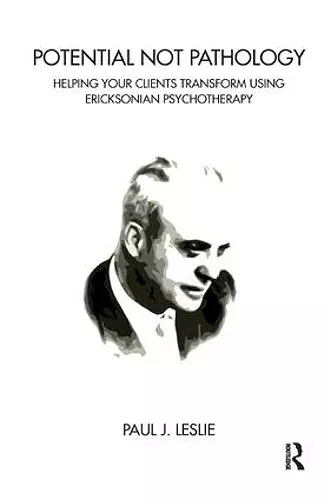Potential Not Pathology
Helping Your Clients Transform Using Ericksonian Psychotherapy
Format:Paperback
Publisher:Taylor & Francis Ltd
Published:30th Sep '14
Should be back in stock very soon
This paperback is available in another edition too:
- Hardback£135.00(9780367102760)

This book is designed to assist counsellors who would like to use and understand the psychotherapeutic strategies of Milton Erickson but often find it confusing, intimidating or unrealistic. Using colourful case studies and stories told in everyday language, this work will educate and help professionals in being able to understand how to adapt and apply creative and resourceful therapy interventions based on the concepts of Ericksonian psychotherapy. It will also assist clinicians and therapists in easily implementing the concepts of Ericksonian psychotherapy into their work in order to energise and revitalise their therapy sessions. Subjects explored include client resistance and client potential, the role of imagination and playfulness in the therapeutic work, and the healing possibilities hidden within stories and metaphors.
'Paul J. Leslie has written a delightful introduction to some of the core concepts of an Ericksonian approach to therapy. Well-illustrated with cases stories from both Milton Erickson and the author's own extensive experience as a psychotherapist, Leslie makes Erickson's approach accessible to a broad spectrum of practitioners. We celebrate Leslie's inspiring and down-to-earth contribution to fostering a resource-focused, Ericksonian approach to helping people transform.'- Hillary Keeney, PhD, and Bradford Keeney, PhD, authors of Circular Therapeutics: Giving Therapy a Healing Heart and Creative Therapeutic Technique: Skills for the Art of Bringing Forth Change'There have been three great waves that have swept through psychotherapy. The first was oriented to the past, what was wrong with people, and the therapist as the expert who diagnosed and treated the illness. The second was more present-oriented, here and now, but still focused on problems and the therapists' expert diagnosis of the pathology. The third wave, mostly initiated by Carl Rogers and Milton Erickson, moved away from pathology to potential, resources, and possibilities. This wave was present- to future-oriented. Paul J. Leslie has written a practical, fun book firmly based in this third-wave sensibility. You will likely come away from this book feeling hopeful and energised, having learned a great deal about being a more effective therapist.'- Bill O'Hanlon, author of Do One Thing Different and Change 101
ISBN: 9781782201403
Dimensions: unknown
Weight: unknown
152 pages